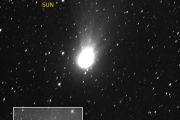
Copernical Team
DARPA, AFRL, Lockheed Martin And Aerojet Rocketdyne team up for Hypersonics test
 The Defense Advanced Research Projects Agency (DARPA), Air Force Research Lab (AFRL), Lockheed Martin (NYSE: LMT) and Aerojet Rocketdyne (NYSE: AJRD) team successfully flight tested the Hypersonic Air-breathing Weapon Concept (HAWC). This historic flight reached speeds in excess of Mach 5, altitudes greater than 65,000 feet and furthers the understanding of operations in the high-speed flight re
The Defense Advanced Research Projects Agency (DARPA), Air Force Research Lab (AFRL), Lockheed Martin (NYSE: LMT) and Aerojet Rocketdyne (NYSE: AJRD) team successfully flight tested the Hypersonic Air-breathing Weapon Concept (HAWC). This historic flight reached speeds in excess of Mach 5, altitudes greater than 65,000 feet and furthers the understanding of operations in the high-speed flight re Station waits for private astronauts during science and spacewalk preps
 The seven-member Expedition 67 crew will wait an extra day to greet the first private astronauts who are due to launch this weekend to the International Space Station. In the meantime, the orbital residents focused on human research and physics today while gearing up for a pair of spacewalks later this month.
The first private astronaut mission, Axiom Space-1 (Ax-1), is now scheduled to la
The seven-member Expedition 67 crew will wait an extra day to greet the first private astronauts who are due to launch this weekend to the International Space Station. In the meantime, the orbital residents focused on human research and physics today while gearing up for a pair of spacewalks later this month.
The first private astronaut mission, Axiom Space-1 (Ax-1), is now scheduled to la Amazon signs with Arianespace for 18 Ariane 6 launches to deploy Project Kuiper constellation
 Arianespace and Amazon (NASDAQ: AMZN) announced an unprecedented launch service contract during the International Space Symposium in Colorado Springs, USA, on April 5. Under the terms of the contract, Arianespace will perform 18 Ariane 6 launches for Amazon's Project Kuiper over a period of three years from Europe's Spaceport in French Guiana. Among the 18 launches planned for the deployment of
Arianespace and Amazon (NASDAQ: AMZN) announced an unprecedented launch service contract during the International Space Symposium in Colorado Springs, USA, on April 5. Under the terms of the contract, Arianespace will perform 18 Ariane 6 launches for Amazon's Project Kuiper over a period of three years from Europe's Spaceport in French Guiana. Among the 18 launches planned for the deployment of From sample to results: in-space data analysis enables quicker data return
 Space-based computing has achieved a significant milestone by enabling investigators conducting an experiment onboard the International Space Station (ISS) to go from sample analysis to results while the experiment was on station. The ability to process data onboard the ISS drastically reduces the time required for investigators to get data and enables potential iteration of the research while t
Space-based computing has achieved a significant milestone by enabling investigators conducting an experiment onboard the International Space Station (ISS) to go from sample analysis to results while the experiment was on station. The ability to process data onboard the ISS drastically reduces the time required for investigators to get data and enables potential iteration of the research while t Rocket Lab to attempt first mid-air helicopter capture of Electron Rocket
 Rocket Lab USA, Inc (Nasdaq: RKLB) reports that during its next Electron launch, a commercial rideshare mission currently scheduled in April 2022, the company will attempt a mid-air helicopter capture of the Electron launch vehicle for the first time.
The "There and Back Again" mission, Rocket Lab's 26th Electron launch, will lift off from Pad A at Launch Complex 1 on New Zealand's Mahia P
Rocket Lab USA, Inc (Nasdaq: RKLB) reports that during its next Electron launch, a commercial rideshare mission currently scheduled in April 2022, the company will attempt a mid-air helicopter capture of the Electron launch vehicle for the first time.
The "There and Back Again" mission, Rocket Lab's 26th Electron launch, will lift off from Pad A at Launch Complex 1 on New Zealand's Mahia P NASA hits new snag with Artemis test at Kennedy Space Center, could threaten Axiom mission
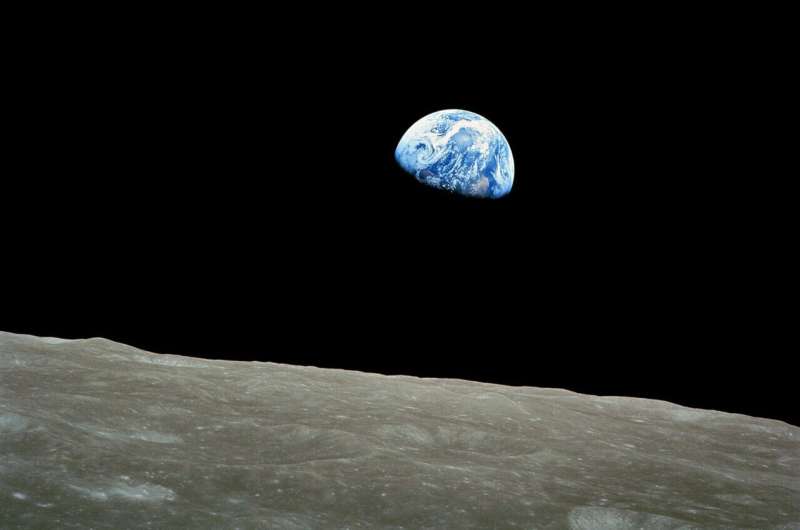
NASA looked to complete its Artemis moon rocket tanking test at Kennedy Space Center after an issue forced a scrub on Sunday, but a new valve issue forced mission managers to call it off again.
NASA officials had already pulled the plug Sunday on the tanking test of the fully integrated Space Launch System rocket and Orion capsule at KSC's Launch Pad 39-B when it wasn't able to keep safely pressurized the mobile launcher on which the hardware sits.
That issue was mitigated overnight, but Monday's redo effort also fell short of its goal of filling and draining both the core and upper stages of the rocket with 730,000 gallons of super-cooled liquid hydrogen and liquid oxygen.
NASA teams were able to work around a series of issues Monday getting the liquid oxygen (LOX) loaded, but were ultimately stymied ahead of loading the liquid hyrdrogen by a vent valve, also located on the mobile launcher, that supplied pressure to the core stage of the rocket.
"Due the vent valve issue, the launch director has called off the test for the day," reads a post on NASA's Exploration Ground Systems Twitter.
In space, Russians and Americans remain 'dear friends': astronaut
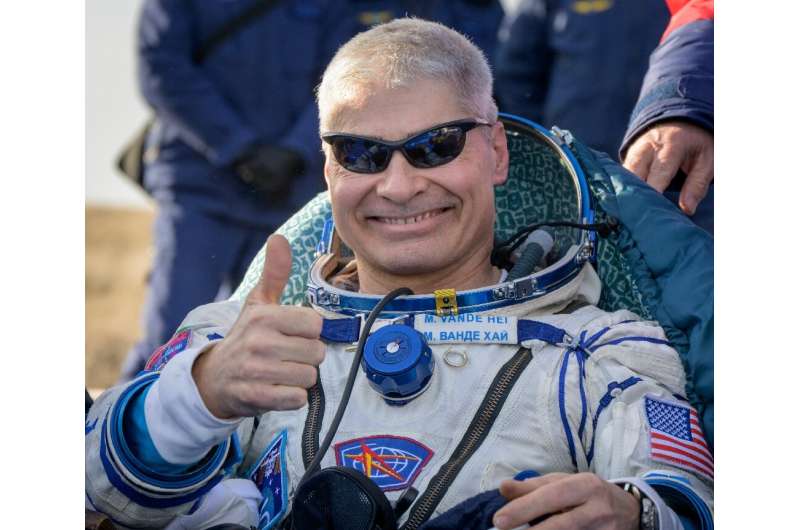
After nearly a week back on Earth, NASA astronaut Mark Vande Hei said Tuesday the relationship between US astronauts and Russian cosmonauts remained positive while on board the International Space Station, despite their countries' animosity over Moscow's February invasion of neighboring Ukraine.
Vande Hei landed in Kazakhstan last Wednesday in a Russian capsule, along with cosmonauts Anton Shkaplerov and Pyotr Dubrov.
"About my relationship with my Russian crewmates, they were, are and will continue to be very dear friends of mine," the American Vande Hei said during a press conference in Texas Tuesday.
More delays for NASA's moon rocket test, fueling stalled
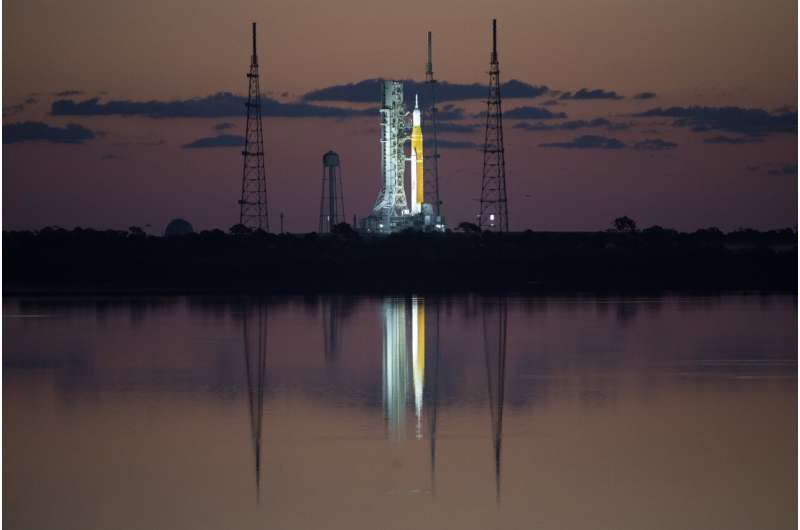
Ax-1: Why the private mission to the International Space Station is a game changer
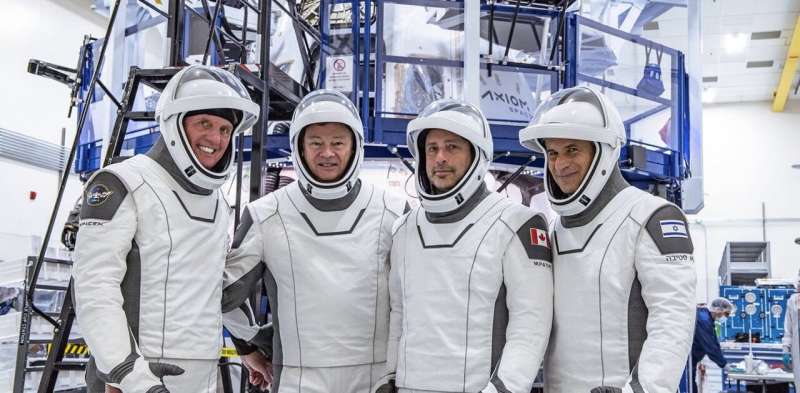
It's not long since billionaires were competing to get to the "edge of space." Now, the first set of private citizens are getting ready to take a SpaceX shuttle up to the International Space Station (ISS). Unlike the short "joyrides" of Richard Branson and Jeff Bezos, this mission will be reaching the roughly 400km altitude needed to dock with the ISS.
The mission by the US commercial aerospace company Axiom Space is a major step forward in private space travel, and is part of a plan to build a private space station.
Arctic simulation of moon-like habitat shows well-being sessions can improve mental health in extreme isolation
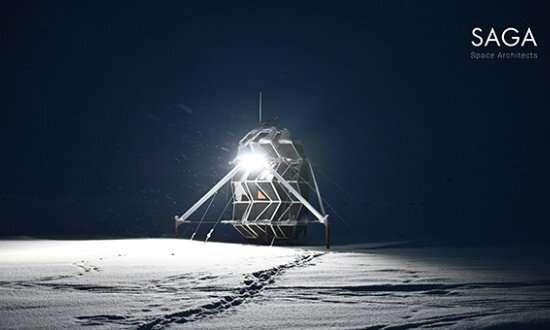
Researchers at the University of Surrey and the University of Milano-Bicocca have partnered with SAGA Space Architects to investigate the psychological impact of social isolation in harsh environments, such as on the moon. This research formed part of the LUNARK project which explored how humans could survive on the moon and have successful habitats there in the future.
The LUNARK project was the first ever Arctic simulation of a lunar mission. As part of the project, two space architects, Sebastian Aristotelis and Karl-Johan Sørensen, designed an airtight, portable, foldable pod that enables its occupants to live self-sufficiently. From September 2020, the architects lived inside the pod for 61 days in northern Greenland—a place that reflects the harsh environment of the moon and its freezing temperatures. The pod was built to withstand external threats—which was tested in the arctic simulation in the form of a visit from a local polar bear—and was designed to leave no trace of waste in the environment.
To investigate the impact of social isolation on the men, the researchers measured their perceptions of time, their positive and negative emotions, levels of satisfaction of basic psychological needs (e.g.
































